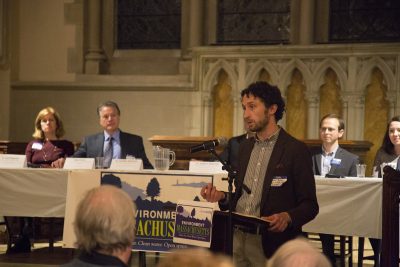
The Old South Church in Boston was filled with a crowd of approximately 50 as Environment Massachusetts hosted a panel Monday night to discuss the importance of renewable energy and the urgency of assessing sustainable energy now.
The panel, titled “The Road to 100 Percent,” featured five expert speakers, included professors, a representative from Environment Massachusetts and a former congressman.
Ben Hellerstein, the state director for the Environment Massachusetts Research and Policy Center, delivered the introduction. Hellerstein said he works with organizers and citizen members to protect Massachusetts’ natural resources, and he stressed the importance of acting immediately to try to save the planet.
“Now is the time for us to be bold,” he said during the panel. “Now is the time for us to take big steps. Now, especially now, the rest of the country, and indeed, the rest of the world, are counting on us in Massachusetts to continue leading the way toward solutions on climate change.”
Jonathan Buonocore, program leader at Harvard University’s Center for Health and the Global Environment, addressed the crowd by emphasizing the fact that climate change is about more than just the cleanliness of the environment, describing it as “the greatest global health threat in the 21st century.”
Buonocore said he supports the push toward renewable energy sources, claiming that doing so would have significant health benefits.
“For a lot of people, things like the sea level rise or food insecurity may seem like something that’s going to happen a long time from now,” he said. “These air quality benefits and the health gains [of renewable energy] are going to happen here and very very soon.”
Attendee Alejandro Delgado, 39, from Medellín, Colombia said after the event that the urgency of switching to renewable energy is very important.
“Now it’s a matter of life and death,” Delgado, a graduate student at Boston University, said. “We are using so much energy and polluting the air and polluting the oceans that there’s going to be a moment when we will not have food to eat, we will not be able to survive. Why not support [the movement]?”
After speaking on the panel about the importance of making energy storage and renewable energy sources more affordable, Sanjeev Mukerjee, the faculty director at Northeastern University’s Center for Renewable Energy Technology, told The Daily Free Press that the high price and complicated logistics of renewable energy have kept him from personally adopting an even more sustainable lifestyle.
“I have not [adopted renewable energy habits] because of the costs and logistics,” he said. “That’s what we’re trying to do, because if more and more companies are able to package them in a more cost-effective way, then of course there will be more adopters, including me.”
Several attendees said they enjoyed hearing the panelists’ comments on a topic they are passionate about.
Madeleine Barr, 26, from Ramsay, New Jersey, said she wanted to hear others’ opinions on renewable energy, since she works in the clean energy field.
“I’m passionate about these issues and was curious to hear from different organizations and companies represented and to see what the idea sharing is looking like,” she said.
Gillian Daniels, 28, of Somerville, said in addition to attending the panel, she and her roommate have done what they can to help the switch to renewable energy sources by making small changes to their daily lives.
“We changed all our light bulbs to more energy efficient ones and more cost efficient ones,” she said. “I don’t drive a car. I only use public transportation. I didn’t like contributing to my carbon footprint with my car.”
Nathan Phillips, 49, of Newton, said as an active member of the divestment movement at BU, he was excited to have attended the panel.
“I needed this on an emotional level, on a mental level,” he said. “We need to rally around a positive direction in this country and that’s what this represents to me.”
Phillips, a professor in the Department of Earth and Environment at BU, praised students’ efforts to get involved in the movement.
“I believe that students have led on climate at Boston University, they’ve led on so many ways in sustainability,” he said. “Their instincts have proven to be more on target than their administrators and the older generation in so many ways.”



















































































































Antonio Picon • Nov 15, 2016 at 8:44 am
Excelente article! To the point!